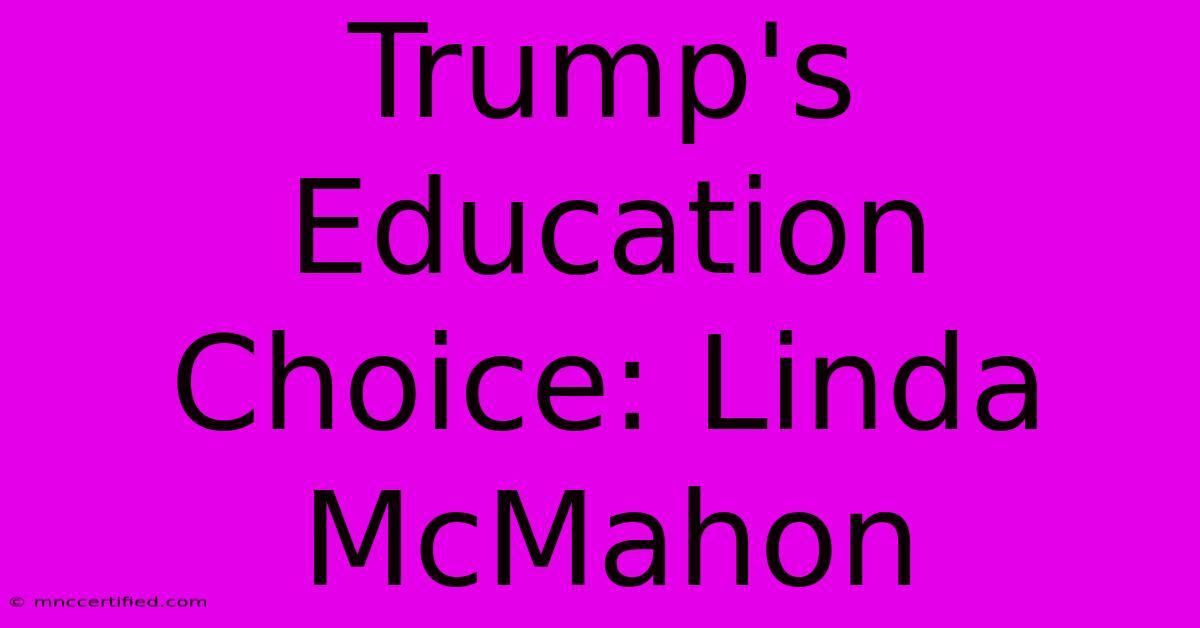Trump's Education Choice: Linda McMahon

Table of Contents
Trump's Education Choice: Linda McMahon – A Deep Dive into Her Leadership and Impact
Linda McMahon, a prominent figure in the business world and Republican politics, served as the Administrator of the Small Business Administration (SBA) under President Donald Trump. While not directly involved in the Department of Education, her appointment offers valuable insight into Trump's broader approach to governance and his selection of key personnel. Understanding McMahon's background and her role within the Trump administration provides context for analyzing the administration's overall education policies, even indirectly.
Linda McMahon: From Wrestling to Washington
Before entering the political arena, Linda McMahon co-founded World Wrestling Entertainment (WWE) with her husband, Vince McMahon. Her business acumen and success in building WWE into a global entertainment powerhouse are undeniable. This experience, characterized by strategic planning, marketing savvy, and management of a large workforce, shaped her approach to public service. Her transition from the entertainment industry to the SBA highlights a recurring theme in the Trump administration: a preference for individuals with significant business experience over traditional political backgrounds.
McMahon's SBA Leadership: Relevance to Education
While the SBA's focus isn't directly education, its mission – supporting small businesses – has indirect implications for the educational landscape. Small businesses are major employers, and a thriving small business sector often correlates with a skilled workforce. Therefore, McMahon's efforts to streamline SBA processes, reduce regulatory burdens, and encourage entrepreneurship could be indirectly linked to education policy. A robust small business sector needs a skilled workforce, which in turn relies on a strong education system. This connection, though indirect, is important to consider when evaluating the Trump administration's overall approach to economic development and its relationship to educational opportunities.
The Trump Administration's Education Policies: A Broader Context
To fully understand the potential impact of McMahon's appointment, we need to consider the broader context of the Trump administration's education policies. These policies generally emphasized:
- School Choice: Increased emphasis on charter schools and school vouchers, aiming to provide parents with more options for their children's education.
- Reduced Federal Regulation: Efforts to decrease federal oversight of education, returning greater autonomy to states and local school districts.
- Focus on STEM Education: Increased attention to science, technology, engineering, and mathematics (STEM) education, seen as crucial for future economic competitiveness.
While McMahon's role at the SBA didn't directly shape these specific policies, her appointment reflects the administration's preference for individuals with business backgrounds and a focus on economic growth. This emphasis on economic prosperity, in turn, could be seen as supporting the administration's education goals, indirectly fostering a skilled workforce capable of contributing to a thriving economy.
Analyzing the Impact: Successes and Criticisms
Analyzing the impact of McMahon's appointment requires considering both successes and criticisms. Supporters might point to the SBA's achievements during her tenure, such as streamlined processes and increased lending to small businesses. Conversely, critics might highlight areas where the SBA could have done more to support specific sectors or address concerns about equity and access to capital. Similarly, the Trump administration's education policies faced both praise and criticism, with debates continuing regarding the effectiveness of school choice initiatives and the impact of reduced federal regulation.
Beyond the Direct: Understanding the Broader Narrative
It is crucial to understand that Linda McMahon's role at the SBA didn't directly influence the day-to-day workings of the Department of Education. However, her appointment and the overall approach of the Trump administration provide crucial context for understanding the administration's overall priorities and their indirect impact on education. By examining her business background and her position within the broader political landscape, we gain a deeper understanding of the forces shaping education policy during that period.
This analysis demonstrates the importance of considering indirect connections and the broader political context when assessing the influence of specific individuals on education policy. The intertwining of economic development and education underscores the need for a holistic approach to understanding the complex dynamics at play.

Thank you for visiting our website wich cover about Trump's Education Choice: Linda McMahon. We hope the information provided has been useful to you. Feel free to contact us if you have any questions or need further assistance. See you next time and dont miss to bookmark.
Featured Posts
-
Drones Spotted Over Nj Police Inquiry
Nov 20, 2024
-
Pokemon Trading Card Game Sleeves
Nov 20, 2024
-
Trump Appoints Mc Mahon And Oz
Nov 20, 2024
-
Lautaro Martinez Sinks Peru
Nov 20, 2024
-
Alabamas Philon Nba Draft Stock Up
Nov 20, 2024